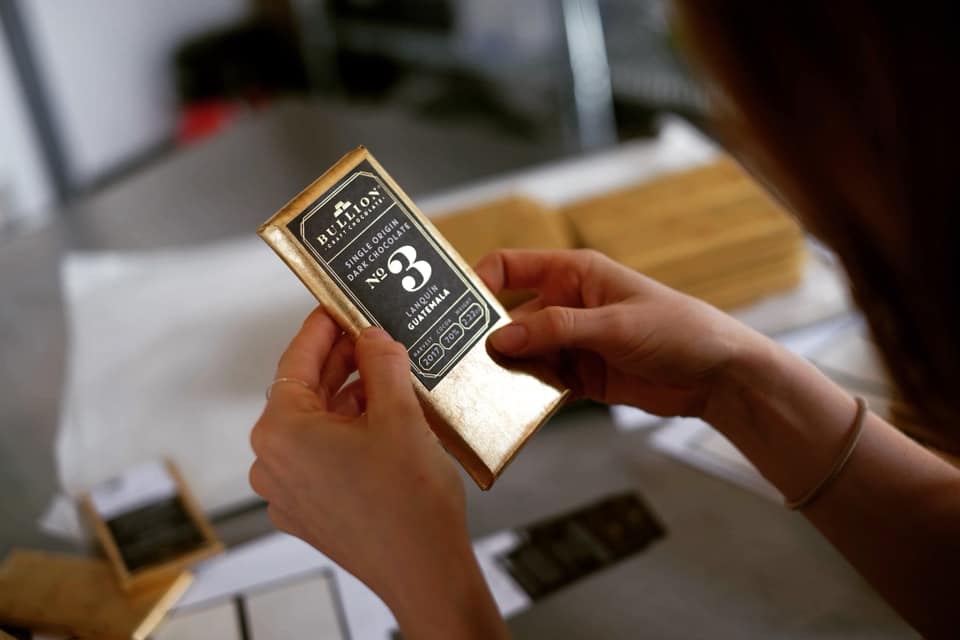‘They’re used to a sweet, cheap fix’: Bullion is treating chocolate like fine wine
Bullion is determined to do for chocolate what others have done for alcohol and coffee, writes Martin Flynn

It’s not just chocolate – it’s a story,” says Max Scotford, who hails from the Derbyshire town of Dronfield but is now comparing the “jammy, fruity” notes of a Guatemalan option to the “green olive vibe” of a Bolivian alternative.
Either of the 63g Bullion Chocolate bars would cost a customer almost £8. Scotford – born the same year Cadbury relaunched the Freddo at 10p – believes his “bean to bar” brand can change perceptions of chocolate’s value.
One eye-catching effort was a recent collaboration with the Royal Mint, which saw Bullion bars flecked with 23-carat gold leaf. But at his Sheffield factory, Scotford suggests the products which have earned international awards and website-crashing demand reflect substance as well as style.
Since he launched Bullion on his own in 2016, production has almost quadrupled to 1,500 bars per week, and the business now employs eight staff and four interns. That said, Scotford’s seven-day work schedule still includes helping to hand wrap chocolate blocks in gold paper.
The “bean to bar” stamp signifies that he imports raw cocoa beans and controls each of the eight stages in Bullion’s month-long production process. “Single origin” or “single estate” tags detail which growing region or individual farm a bar’s beans came from.
“Craft chocolate’s still a tiny market in the UK because people don’t really get it yet,” says Scotford, 26. “They’re used to a sweet, cheap fix; we’re doing something on the level of a fine wine. Depending on where and how beans have been grown, the chocolate will taste very different. I want to reveal that ‘terroir’. I don’t want to pooh-pooh someone who wants a Kit Kat. But for me, it’s a different thing.”
Scotford first dabbled in chocolate-making as a student after he was inspired by a programme on UK firm Willie’s Cacao. He was intrigued by chocolate’s history, particularly “how the Mayans valued it more than gold”. Initially, his own attempts involved a £130 Indian spice grinder and a microwave.
Mildly dyslexic, Scotford had preferred hands-on subjects at school and at 12 he trialled his first business: selling sandwiches at a golf course under the name “Sandwedge”. That interest in food and enterprise led to catering college, followed by an events management degree at Sheffield Hallam University.
He then took a graduate sales role with digital firm Quba, something he views as crucial to Bullion’s success. “I had no business acumen before that,” he says. “I learned a lot. I’ll always be thankful for that experience.”
Web orders quadrupled, brownies were shipped as far as the Solomon Islands, and key ‘gifting periods’ saw interest balloon
After two years with Quba, he saw launching Bullion as a “now or never” decision. To cover the £30,000 start-up costs, Scotford sold his house, moved back in with his parents and secured £5,000 from Sheffield Hallam. He also cashed in on branding rights he’d trademarked as a 17-year-old, when he’d anticipated the fit food trend and scouted the potential for protein-boosted yoghurt.
But Bullion was the first time he felt certain about an idea. “I knew where the bar would sit on the shelf,” he says. “‘Bullion’ was so important for the brand; it embodied everything I wanted to achieve with chocolate. Purity; something special; some of the finest beans you can get.”
Scotford was heavily influenced by the craft beer and coffee sectors, which bloomed in the US before gaining traction in the UK. “When we launched there was only a handful of bean-to-bar makers here, and we were the first craft one in Yorkshire,” he says.
For the first year he worked alone and flat out to produce up to 400 bars a week. He focused on retailers he thought would “get” his niche product and utilised sales techniques from the tech sector, rather than the “market stall” approach he saw in some craft chocolate competitors.

His approach put Bullion bars into Harvey Nichols and Fenwick within 12 months, while recognition at the 2017 and 2018 international Academy of Chocolate Awards was further proof for Scotford that “it wasn’t just my mum who liked what I was doing”.
With his small factory running at capacity, the dilemma became finding investment without losing control. Scotford struck gold when a local entrepreneur provided the equivalent of £55,000 for a minority stake, and in late 2018 Bullion’s production shifted into the Cutlery Works Food Hall on Sheffield’s gentrified Kelham Island. The move also allowed for an adjacent cafe, funded through a 20-day £11,000 Kickstarter campaign.
Given the seasonal nature of chocolate sales, consistent cafe revenues had become a valuable constant for Bullion. But when his venue closed during lockdown, along with many of the speciality coffee shops which usually stock his products, Scotford shifted his focus to manufacturing and online. Web orders quadrupled, brownies were shipped as far as the Solomon Islands, and key “gifting periods” saw interest balloon.
“We did £5,000 in a couple of hours, just on Easter eggs,” Scotford says. “We had to close the website so we could make them all in time.”
Scotford views diversification and collaboration as essential. He’s already worked with breweries on bean-to-beer releases, while a partnership with Caravan Coffee Roasters means Bullion’s BRÜ BAR can be found across London, including in Caravan’s cafe at The Savoy. But he seems proudest of the golden gift sets produced earlier this year for the Royal Mint, something he says “could not be more on-brand” for his company.
Current plans include liqueurs, candles made from cocoa husks, and eventually cocktails at a “chocolate bar”, a venue for which Scotford ambitiously bought a web address before he was legally allowed to drink.
For now, he splits his time between his family’s house in Dronfield and his girlfriend’s home in Leeds. Going out for dinner remains one of his favourite ways to relax, though he’s recently taken up running as “a release” from the non-stop demands of growing a business.
Naturally, the subject of maintaining a healthy balance leads to the most important question for anyone in Scotford’s profession. “I eat chocolate every day,” he says, only a touch sheepishly. “Someone has to make sure the baked goods taste right!”
Join our commenting forum
Join thought-provoking conversations, follow other Independent readers and see their replies
Comments